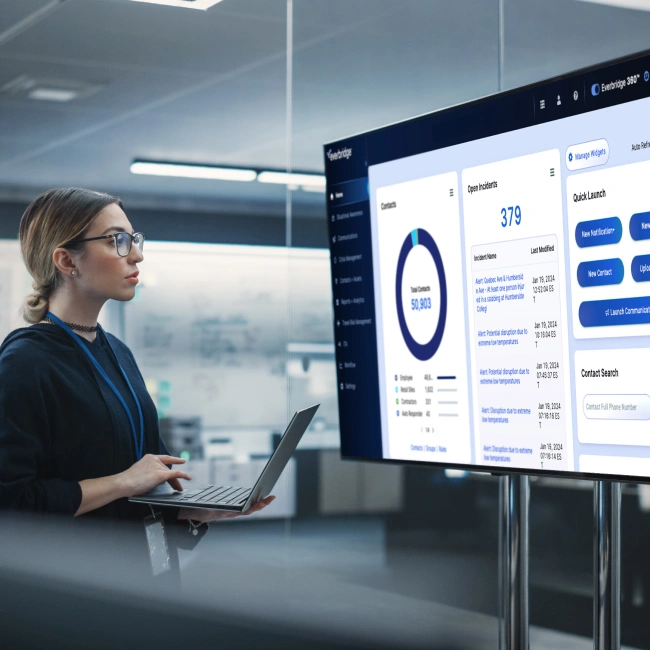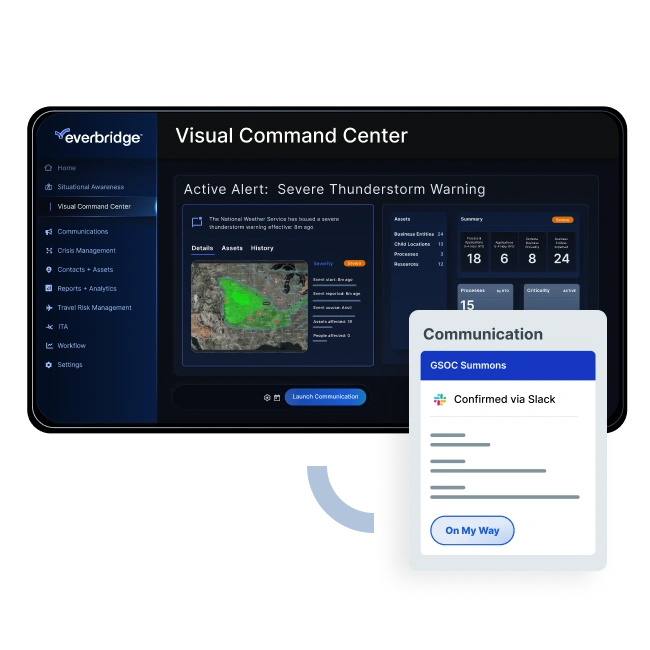Operational resilience
Prepare for unforeseen challenges, maintain seamless operations, and protect your reputation in times of crisis.

Operational resilience vs organizational resilience
Operational resilience focuses on maintaining critical functions during disruptions, addressing immediate, day-to-day challenges. In contrast, organizational resilience takes a broader view, encompassing strategy, culture, and the ability to adapt and thrive in the face of change. Together, these concepts blend continuity with long-term adaptability, creating a robust foundation for sustainable success.
Common operational resilience challenges
Regulatory compliance
Keeping up with evolving regulations and ensuring compliance can be resource intensive and complex.
Complexity of systems
Organizations rely on complex, interconnected systems, making it difficult to identify and manage potential vulnerabilities.
Main regulations for operational resilience globally
European Union
DORA sets rules for EU financial entities on ICT risk management, incident reporting, resilience testing, and third-party risk monitoring. It also mandates reporting major ICT incidents to authorities to ensure operational resilience.
United Kingdom
The UK’s PRA’s operational resilience rules require firms to identify important services, set impact tolerances, and ensure disruptions stay within these limits through testing and reporting.
Australia
Australia’s APRA Prudential Standard CPS 230 mandates companies to maintain a risk management framework, including governance, risk assessments, internal controls, and business continuity planning.
Benefits
- Enhanced communication: share critical data with executives, employees, stakeholders and external parties.
- Improved incident monitoring: by offering early and detailed insights on how and what threats will impact your operations, helping you stay ahead of potential disruptions.
- Coordinated response: improve operational resilience with swift and efficient coordination of resources.
- Manage third-party risk: link data dependencies across services and locations for clear visibility into what’s impacting your organization.
- Enhanced preparedness: conduct scenario testing, set impact tolerances, automate communications and post-event analysis to enhance incident response time.

Features
- Automated alerts: ensure timely notifications are sent to the right people at the right time, reducing response times during an event.
- Scenario testing: conduct comprehensive tabletop exercises and scenario testing to gain valuable insights.
- Data dependency linkage: gain unparalleled monitoring capabilities for your ICT third-parties by seamlessly linking data dependencies across services, providers, applications, locations, and business processes.
- User-friendly interface: which offers intuitive shareable dashboards, impact trackers, reports, and surveys.
- Centralized hub: store and regularly review plans to help with managing, and responding to critical incidents.

Solution
Everbridge helps you manage your operational resilience strategies by identifying key information assets and ICT-supported functions, protecting and preventing events from impacting ICT-supported business functions, providing early threat identification and scenario testing and providing response and recovery by establishing and maintaining business continuity plans.
BC in the Cloud® helps WEX, Inc. achieve operational resilience
With limited capabilities from its existing business continuity and disaster recovery software, WEX began researching alternative solutions in 2017. The rapidly growing company needed a system that was flexible, scalable, provided greater reporting capabilities, and offered a positive end-user experience.
WEX narrowed its initial research of dozens of vendors down to five companies, then to three, and ultimately selected BC in the Cloud®.


How it works
Everbridge helps your organization identify critical business processes and the risks that could leave it vulnerable. Once assessments are done, Everbridge is used to create recovery plans, test the plans, and respond during a crisis, and then report and improve. It is scalable to accommodate the needs of both large and small organizations.
Counter risks effectively
Everbridge Risk Intelligence offers comprehensive global risk insights to empower your decision-making process. This video highlights how actionable data can lead to lifesaving actions, ensuring your operations continue seamlessly. With our dedicated Risk Intelligence Center available 24/7, 365, we provide the precision risk intelligence necessary to keep you informed and prepared.

Outcome
Using Everbridge can help you respond and recover from ICT-related incidents. Organizations will gain a greater understanding of what services and processes impact critical functions within their business. With improved threat detection, scenario testing, enhanced coordination, and sharing of information, you can reduce response times and improve the overall resiliency of your operations.
Achieve operational resilience in a regulated world
Building true operational resilience has never been more critical, especially in the face of regulations like DORA and the Bank of England’s operational resilience framework


Everbridge named a Leader in The Forrester Wave™: Critical Event Management, Q4 2023
According to a Forrester TEI Study 20231, organizations using the Everbridge CEM platform demonstrated improved capabilities to respond to and contain disruptions, effectively protecting employees, assets, and business processes. Over three years, the quantified benefits are:
- Businesses saved up to $3 million in efficiency gains by reacting quickly to unplanned events.
- Intelligent alerting helped organizations save up to $2 million by improving workflows and addressing IT issues efficiently.
- Enhanced coordination and 24/7 support allowed security teams to save $1.5 million.
Industry solutions for operational resilience
Financial services
For financial organizations, Everbridge enhances operational resilience by coordinating regulatory compliance and empowering resilience. By utilizing advanced communications, threat detection, and real-time alerts, financial institutions can improve response times and mitigate risks, helping to improve overall resiliency.

Additional resources

Understanding DORA: How to operationalize digital resilience
In an interconnected world, digital resilience is crucial for navigating crises and safeguarding financial and security assets. The European Union (EU), comprising 27 countries and 450 million people, recognizes the significance of digital resilience and has introduced regulatory mandates.

Operationalizing resilience for your organization
Effective risk intelligence is the cornerstone of any resilient organization. It involves understanding and monitoring the potential risks that could impact an organization and its employees. This goes beyond immediate concerns and involves looking at the bigger picture.

The ultimate operational resilience handbook
A practical guide for risk professionals to manage the multiple dimensions of operational resilience.



